Leaving his Mark
Winterset

The life story of John Wayne began in the small Iowa town of Winterset...

...now the home of the John Wayne Birthplace & Museum. Marion Robert Morrison was born on May 26, 1907. The Morrison family then moved to Earlham, Iowa, where they switched his name from Marion Robert to Marion Michael when his brother was born in 1911 and given the name Robert. They rented a two-story home at Walnut Ave and NW 2nd St (photos courtesy of The John Wayne Birthplace) before moving on to Brooklyn, Iowa, in a house located on Jackson Street.
Palmdale

The Morrison farm was in Antelope Valley, an arid basin just over the coastal range of California Mountains north of Los Angeles. Their eighty acres property was located near the Southern Pacific Railroad tracks, in the desert community of Palmdale. The picture shows the Palmdale train station.
Glendale

Young John Wayne's parents relocated once more, from Lancaster to Glendale, in 1916. The Morrisons first rented a small house at 421 South Isabel. They temporarily moved to another rented house at 315 South Geneva Street, pictured here.

The Morrisons moved several times during their years in Glendale. Young John Wayne's parents got a house of their own at 404 North Isabel in 1918, seen here.

Young Duke Morrison attended Glendale Union High School between 1921 and 1925. He played football for the 1924 league champion Glendale High School Dynamiters. Glendale High School recently renamed the 1,559-seat John Wayne Performing Arts Center at 1440 East Broadway (pictured here), used for lectures, films, conferences, and performances.
USC

In 1925, the University of Southern California (USC) offered Duke Morrison a football scholarship and the young man became a USC Trojan. Young John Wayne most likely went to school in this building (Courtesy of the USC School of Cinematic Arts).

Before his football career came to a sudden end, Duke Morrison played a USC offensive tackle. Young John Wayne was arguably the most famous Trojan of the USC football team. For several years, the University of Southern California displayed these mementos of his football career (Courtesy of the USC School of Cinematic Arts).
encino

John Wayne had lived at 4735 Tyrone Street in Van Nuys from 1945 to 1948, a short way from his home studio Republic. He purchased a five-acre estate with a twenty-two-room farmhouse in Encino, at 4750 Louise Avenue where he stayed until he moved his family to Newport. The house is still there today. The ten-foot-high brick wall with an electrically operated gate was erected by its most famous habitant.
batjac offices, Los Angeles

Before John Wayne formed Batjac Productions, he had bought an office building for his Wayne-Fellows company at 1022 Palm Avenue. In 1954, Wayne-Fellows became Batjac. Wayne sold the building (two blocks from today's Whisky-a-go-go location) in 1965 and relocated to Paramount, on the 2nd floor of the Cecil B. DeMille building. During his Paramount years, his letter stationery gave this Batjac address as 5451 Marathon Street. After Brannigan, he moved Batjac again, to 9570 Wilshire Blvd. From Suite 400, he conducted his business until his last year of life.
Saint Joseph medical Center

501 S Buena Vista St in Burbank became an important address for the Wayne family. The Waynes chose the Providence Saint Joseph Medical Center (now between the Walt Disney Studios and Johnny Carson Park) for Aissa’s birth, on March 31, 1956. John Wayne became a grandfather when Toni gave birth to a daughter at St. Joseph’s. John-Ethan was born there, too, February 22, 1962. The statue in the picture is dedicated to Walt Disney's brother Roy and his wife Edna.
newport

John Wayne's home in Newport was on 2686 Bayshore Drive. It was sold in March 1980 for $3.48 million and is gone now, torn down in 2002. One of his main reasons to move to Newport was the 136-foot converted U.S. Navy minesweeper he had purchased in 1962, "The Wild Goose". The Navy had commissioned the YMS 382 during the war and had sold it in 1948.

John Wayne sold his beloved yacht, the Wild Goose, a short time before he died. It is now back in Newport Harbor, owned by the Hornblower Cruise Company and ready for cruises.
Shreveport

For the occasion of John Wayne receiving the Omar M. Bradley Spirit Award in Shreveport on December 14, 1978, he was presented by the “Omar M. Bradley Spirit of the Independence Award” at the Independence Bowl, 3301 Pershing Blvd. Diane Gainey was allowed to follow the recipient with the camera for two days. “In person”, Diane Gainey fondly recalls, “his voice was calming, reassuring, and his comments were to the point.” (courtesy of Diane Gainey).

After he went to the stadium in an escorted motorcade, John Wayne tried on the jacket that goes with the Omar M. Bradley Spirit Award for size (courtesy of Diane Gainey).

John Wayne at the luncheon at the East Ridge Country Club in Shreveport, in conjunction with the Independence Bowl events (courtesy of Diane Gainey).
Napa valley

John Wayne used a short break in the production of Brannigan to shoot over from London to California's Napa Valley. He toured the wineries with Pat Stacy. They stayed at the Silverado Resort, 1600 Atlas Peak Road in Napa County. The southern mansion...

...was built in the 1860s. The Silverado Resort is a 1,200-acre golf, tennis, and spa resort. The venue is named after the Silverado Mine. John Wayne fulfilled a long-held wish for Pat Stacy by staying at the five-star resort with her.
Orange County Airport

Orange County Airport remains his namesake, John Wayne Airport – although people recently toyed with the idea of rechristening it.
Culver City Hotel

John Wayne owned part of the so called Flat Iron Building: the Culver City Hotel at 9400 Culver Blvd, then a few blocks from MGM studios. The hotel is famous for having housed some of the cast of Wizard of Oz. It was also used as a background location in Laurel & Hardy outings. The Flat Iron changed hands ever since it opened in 1924. Charlie Chaplin had been one of the first owners. Wayne always made it available for fundraisers and eventually donated it to the YMCA. The six-story Renaissance Revival building is now a national landmark.
Los Flamingos Hotel, Acapulco

During the 1950s, John Wayne owned a piece of the Los Flamingos Hotel, along with several entertainment personalities, among them his friend Johnny Weissmuller. It can be spotted in Orson Welles‘ Lady from Shanghai. The gorgeous building is located on the Avenida Lopez Mateos, on top of the highest cliffs of Acapulco, 450' high. It still advertises sleeping in „John Wayne’s Room“.
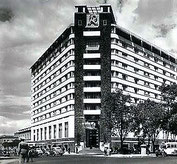
In August 1941, John Wayne and a group of investors went to Mexico City to examine Churubusco Studios. During that business trip, he met the woman who eventually became his second wife, Esperanza Baur, aka „Chata“. Ray Milland introduced them at the Reforma Hotel, Av. Paseo de la Reforma 64. The Reforma eventually became the favorite point for many personalities like Orson Welles. John Wayne and Chata danced there for the first time.
Crillon Hotel, Peru
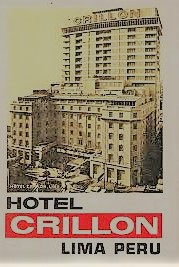
John Wayne met his third wife in Lima, Peru in 1951. At the time he met Pilar on a film set near Tingo Maria, he was staying at the Crillon Hotel, Av. Nicolás de Piérola 589.
Dow Villa Motel

When John Wayne stayed at the famous "Dow's" in Lone Pine, in later years he preferred the Motel room No. 20.

The Hotel Monte Vista at 100 N San Francisco Street stands just off historic Route 66 in Flagstaff, Arizona. Famous guests include John Wayne, Bob Hope, Bing Crosby, and Zane Grey. The scene in Forrest Gump where Tom Hanks steps in dog shit and invents the phrase Shit Happens! was shot on that street.
Nogales
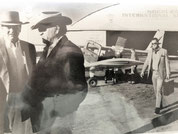
During the making of Red River in Elgin, Ralph Wingfield, the owner of the Guevavi Ranch in Nogales, supplied 300 head of cattle to add to Dunson’s herd. John Wayne started staying at Wingfield’s ranch in the early Fifties. The Wayne family would often return on Wingfield’s invitation to what is now the Hacienda Corona de Guevavi, 348 S River Rd. The snapshot shows Ralph Wingfield greeting the Waynes (Michael arriving in the background) at the Nogales Airport. He flew in in the small plane seen in the background (photo courtesy of Hacienda Corona).
Panama
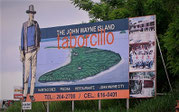
During the early 1960s, John Wayne reportedly purchased the island of Taborcillo, twenty-five miles off the main coast of Panama. The fifty-acres-island has miles of sandy beaches and is a bird sanctuary. After Wayne’s death, his estate sold it. It has changed owners many times before being opened as a tourist resort, sometimes called „John Wayne Island“, complete with a western-themed park.
Loyola High

The entrance of the Hall of Music at Pomona College, 333 N College Way, Claremont, was where John Wayne calls out to Donna Reed in the farewell scene of Trouble Along the Way, „Nice legs – for a copper!“ More college scenes were shot at Loyola Marymount University, 1901 Venice Blvd. Wayne’s sons Michael and Patrick were both graduates of Loyola High.
Cowboy hall of fame oklahoma

John Wayne had established a close relationship with the National Cowboy & Western Heritage Museum in Oklahoma. The day of the opening, June 25, 1965, he led a parade as the Grand Marshal through downtown Oklahoma City to 1700 NE 63rd Street. He gifted sixty-three guns, among them his trademark, large loop Model 1892 carbines, first used in Stagecoach.
Great Western Savings Monument
James Stewart unveiled “The Horseman” on July 22, 1984, at Wilshire and La Cienega Boulevards in Los Angeles, then called Great Western Savings Plaza. The massive 21-foot high bronze sculpture is facing 8484 Wilshire Boulevard. Famous western art sculptor Harry Jackson was commissioned with creating the impressive John Wayne monument.
Pacific View Memorial Park
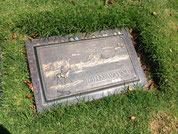
John Wayne was buried at dawn on June 15, 1979. His seven children, Pilar and only a few friends were in attendance at Pacific View Memorial Park, at 3500 Pacific View Dr, Corona Del Mar. The grave remained without a marker for 20 years.
©All text content on this website is protected by copyright and other intellectual property laws. No part may be reproduced without the prior written permission. All photos courtesy of Roland Schaefli, unless otherwise stated.
This website is in no way associated with the John Wayne Estate or business enterprises. Go to johnwayne.com to find the official website and to https://johnwayne.org/ to read about the wonderful John Wayne Cancer Foundation.
more john wayne locations to scout
If you like this site, you'll like the book: the first comprehensive guide to the John Wayne Locations, with hundreds of then-and-now photos, unpublished behind-the-scenes-pictures and detailed tour descriptions
Tracking John Wayne: The complete Tourguide
Find directions to locations and anecdotes from the Duke's movie sets in this new publication from McFarland, available at bookstores and online shops
For all locations mentioned on this website, the book offers behind-the-scenes stories, making-of anecdotes and never before published photos









